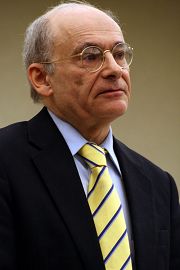(Clearwisdom.net) The satellite signals of NTDTV, an US-based independent Chinese news reporting network, have been interrupted on and off since September 17, 2009. Many indications point toward the Chinese Communist regime's information blockade during its 60-year founding anniversary as the source of these interruptions. Attorney David Matas, an international human rights lawyer and winner of the Order of Canada, suggested that the Chinese Communist regime's interference with the satellite signals is an apparent violation of the UN Human Rights Treaty. Its suppression of freedom of speech is closely related to its ongoing slaughter and torture of dissidents. Matas encourages the world's citizens to pay attention to this case.
According to Matas, any act that suppresses freedom of speech is against the law, because there are international regulations that protect that freedom.
He stressed that the UN Human Rights Treaty has become a basic component of many international usages and many other treaties. That Treaty and human rights have become essential parts of international law. Prohibiting freedom of speech is a definite violation the Treaty, says Matas.
He is concerned about the interruption of the signal and the ongoing slaughter of dissidents in China. He believes that the Chinese government is currently using its power to shut down democratic discussions, to suppress dissidents, and to instigate hatred for Falun Gong, Tibet, and reporters. Without freedom of speech and voices from outside, it would be easy for Beijing to suppress the Chinese people and instigate hatred among them. Matas called on the public "not to view the blockade as an isolated incident, because it is closely connected to the slaughtering and torturing of people in China now."
People must face the issue of the Chinese Communist regime's violation of freedom of speech seriously, according to Matas. All human rights are interconnected. When one is violated, so are the others. To protect every group in China, Matas believes that the world must insist on freedom of speech.
Representatives from NTDTV visited the American Institute in Taiwan (AIT) regarding the issue. AIT spokesperson Thomas Mark Hodges expressed serious concern on this incident to the National Communications Commission (NCC) on October 8. He hopes to hear updates on this issue and, after the NCC releases the investigation report, he will report to the US Department of State and those who are concerned about this issue.
According to Hodge, AIT is concerned about the interests of the US company, especially the violation of free information. AIT is also watching the responses from the Taiwan government.






